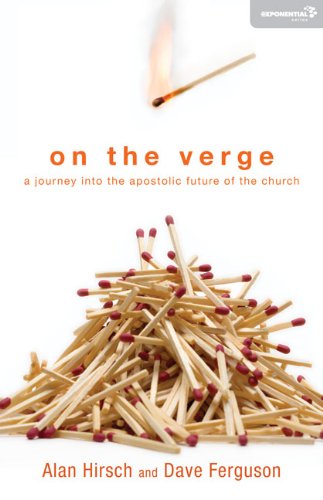"On The Verge" By Alan Hirsch and Dave Ferguson
Alan Hirsch and Dave Ferguson, On the Verge: A Journey Into the Apostolic Future of the Church (Exponential Series) Zondervan, 2011. 352 pgs.
Zondervan, 2011. 352 pgs.
The church is 'on the verge' of massive changes. It must be, or so these authors argue. The old ways of 'being church' in the west are failing and so we must strive for something new. Hirsch and Ferguson call this new thing a 'verge church'. That is, the church as 'apostolic movement', reproducible and missional, focused on the 'mDNA' of 'apostolic genius' (a concept from another one of Hirsch's books). In this book Hirsch and Ferguson bring forth a host of best practices, ideas, programs, and so on (one could insert descriptive words in here for quite some time) with the goal of helping church leaders become part of this new apostolic movement.
In terms of structure, On The Verge is divided into four parts: Imagine (which explores the vision of the apostolic movement), Shift (which explores the programs of the apostolic movement, including things like Ethos and core values), Innovate (which argues for the need to do new things and for methods to help this along), and Move (which is part about missional thinking and part about just getting going). Hirsch is the author of the first two sections and Ferguson of the second two but each chapter also contains a response, which is really a cheer, from the other author.
There were several high points in On The Verge. While Hirsch and Ferguson are analyzing some of the problems the church faces today they are very helpful and clear. Later, they make sure to emphasize the need to have Jesus at the center of any church movement. Further into the book, there are plenty of good insights on how change works, or doesn't work, in most churches.
Still, two things, seemingly minor, very quickly began to bother me. First, I found the style and language of this book, awash in neologism and MBA lingo (chillax, movementum, and mDNA, to name a few small examples), to be incredibly irritating. It is, of course, my own prejudice which finds this kind of thing irritating, but I am prejudiced against it because I find it to be unhelpful and obfuscating to continually make up new terms as a substitute for clearly explaining an idea in the first place. Either a practice is new or ancient, it cannot be both, and simply calling what you are advocating by a new name does not ease the contradiction. Second, there was a general lack of historical knowledge in this book. The authors attribute the classroom model to the greeks, genuinely misunderstand the differences between Greek and Hebraic thinking, and very much misrepresent historic Christian movements in order to fit them into their own paradigms. Neither of these problems are at the heart of the book, but they served to put me on guard.
Much more importantly were a few nagging questions: How can I read an entire book claiming to be apostolic church and find so few biblical parallels? Yes, I know, they are avoiding biblical language, but that is not what I found missing. What about the theology? Where was it?
Quite a few books these days, On the Verge included, complain about how the old ways aren't working. This is naturally followed by some 'new way' being encouraged. But despite the seemingly large amounts of 'the new' which can be found in this book there was one disturbing commonality between the model Hirsch and Ferguson are pushing and the models they so loudly criticize: they are all based on taking best practices from the business world and applying them to the church. What has changed in the interim, and the 'new thing' which Hirsch and Ferguson represent, is simply the most recent attempt at doing the same old thing. The business world has moved on and, if Hirsch and Ferguson have their way, the church will be close behind. I am not convinced that this is the path we ought to pursue.I know some who read this will see no problem here, but I disagree. In The Pastor: A Memoir Eugene Peterson complains of the vocation of a pastor being replaced with "religious entrepreneurs with business plans" and the lack of connection with history. In On The Verge we see the same thing applied to what little ecclesiology the evangelical church has ever had.
Conclusion: 2.5 Stars. Not Recommended. Hirsch and Ferguson have done a decent job of merging the most recent best practices with a vision for church. If that is what you are looking for then I think you are looking for the wrong thing, but there may be no better place to find it than here.
#SpeakEasyOnTheVerge

Comments